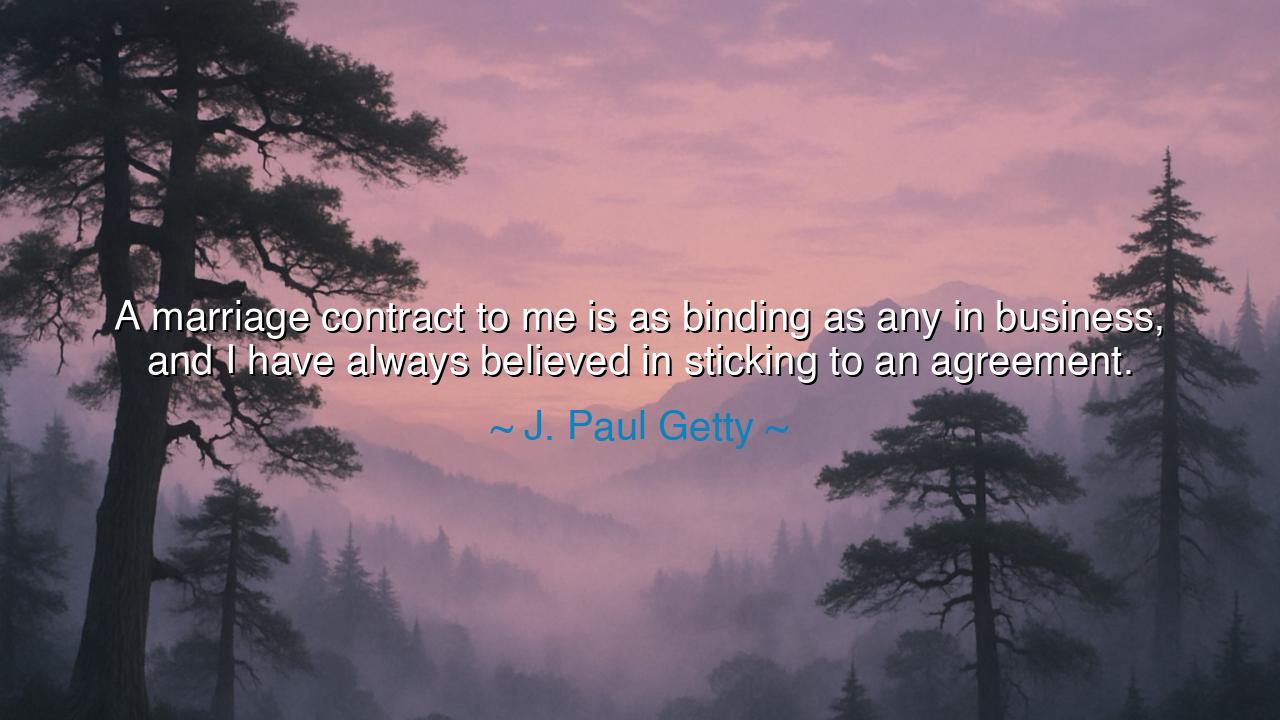
A marriage contract to me is as binding as any in business, and I
A marriage contract to me is as binding as any in business, and I have always believed in sticking to an agreement.






The words of J. Paul Getty, “A marriage contract to me is as binding as any in business, and I have always believed in sticking to an agreement,” reflect the mind of a man who built empires not only upon wealth, but upon principle. In them lies a truth that transcends both commerce and romance — the sacredness of commitment. For Getty, whose life was defined by negotiation, risk, and the relentless pursuit of order within chaos, marriage was not a flight of passion alone, but a covenant of honor — a bond made not in haste, but in integrity.
In the ancient world, to bind oneself by oath was to summon the gods as witnesses. A promise was not a matter of convenience, but of character. The Greeks called it pistis — faith, trustworthiness — the foundation of both love and trade. For a man like Getty, whose dealings spanned nations and fortunes, the idea of keeping one’s word was sacred law. He saw marriage not as a sentimental ritual but as a solemn agreement between souls, equal in weight to any contract sealed with ink and gold. To break it was to betray not only another person, but one’s own nature.
This vision of love through discipline may seem cold to modern hearts, yet it conceals a deeper warmth. For what could be more tender than loyalty that endures through difficulty? What could be more noble than choosing to remain steadfast when feeling falters? The ancients said that true love is not the fire that burns swiftly, but the hearth that never goes out. Getty’s belief in “sticking to an agreement” speaks to that eternal hearth — to the power of steadfast devotion, of two individuals honoring their vows not merely out of emotion, but out of respect for the bond itself.
Consider the story of Marcus Aurelius and Faustina, the Roman emperor and his empress. Their marriage endured through campaigns, illness, and the weight of an empire. Though history tells of strains and sorrow, Marcus wrote of her in his Meditations not as a queen, but as a partner in duty and in endurance. Their union was far from perfect, but it was rooted in commitment — the same unwavering fidelity Getty spoke of. Through storms and solitude, they remained bound by honor, proving that love sustained by principle can weather the tempests of life.
Getty’s words also remind us of the danger of treating promises lightly. In both business and love, modern life tempts us with convenience — the ease of walking away when challenges arise. Yet those who live without loyalty build nothing that lasts. Empires fall when contracts are ignored, and families crumble when vows are treated as options. To honor an agreement is to anchor one’s soul against the winds of change. It is not weakness to remain faithful; it is the highest form of strength — a quiet heroism that demands discipline and humility.
In truth, Getty’s statement bridges two worlds: the pragmatic and the emotional. He speaks as one who understood that love and success alike require responsibility. Passion may ignite a union, but duty keeps it alive. Just as a merchant reviews his ledgers and honors his debts, so too must a husband or wife review the promises made and pay them with daily acts of respect, patience, and care. The “contract” of marriage is not a cage; it is a vessel that carries two souls across the unpredictable sea of life.
Let those who hear these words learn this: to promise is to bind the soul to honor. Whether in love, in friendship, or in enterprise, one’s worth is measured not by what is gained, but by what is kept. Stand by your word, even when it costs you comfort. Keep faith when others would flee. For the strength to endure is rarer than gold, and the heart that honors its vows builds a kingdom that time cannot erode.
Thus, the teaching of J. Paul Getty is not merely about business or marriage — it is about integrity, the sacred thread that weaves both commerce and affection into the fabric of a meaningful life. To “stick to an agreement” is to live truthfully. To honor one’s bond is to build a world where trust endures, where love matures, and where the human spirit, guided by principle, becomes its own eternal wealth.






AAdministratorAdministrator
Welcome, honored guests. Please leave a comment, we will respond soon